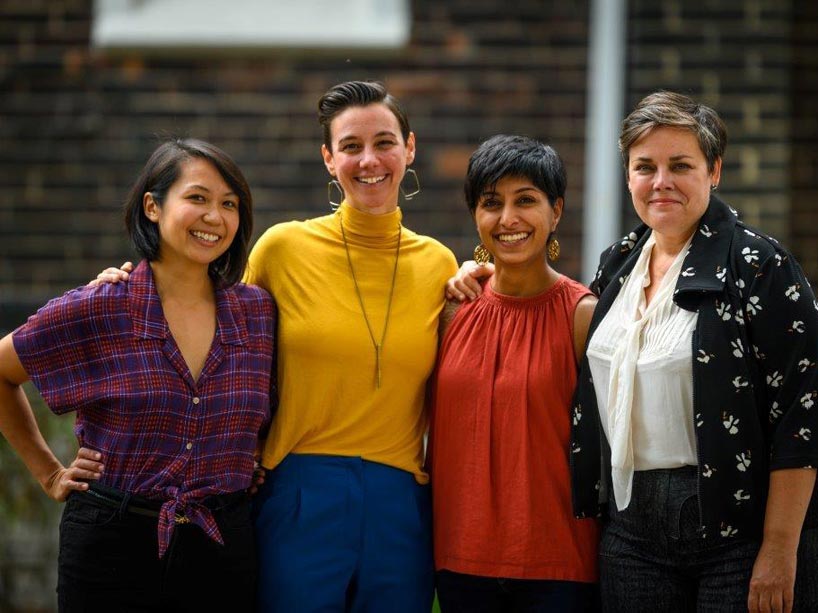Ryerson alumnae are filling the gaps in midwifery

Tiffany Fung, Jenna Bly, Shezeen Suleman and Andrea Luciuk, midwives and co-founders of the Midwifery and Toronto Community Health Program.
When Jenna Bly (midwifery ’13) entered the workforce, the job she wanted didn’t exist. “By the time I was graduating, there weren’t as many [midwifery] jobs…I knew I needed to figure out how I wanted to work,” she said.
She thought about her skillsets: midwives can advocate for their clients and help clients advocate for themselves. “I thought I could help serve those who needed help navigating the system,” she said.
She thought about her surroundings: In her first year as a midwife, Bly was working in Toronto’s east end and noticed that there were people in the community who she could be serving, but wasn’t able to in the traditional setting where she worked.
She thought about how she could carve out a place for herself and other midwives: “I am very interested in working in a multi-disciplinary environment with doctors, nurses and other allied health-care providers,” Bly said. Bly knew that the Community Health Centre (CHC) model was already providing vulnerable people with excellent wraparound care, but in most CHCs, providers were not offering obstetric care. Adding midwives to primary care teams in CHCs seemed like a natural fit.
“Midwives have been historically separate,” Bly said. “Even though midwives are integrated into the health-care system with hospital privileges, there is still misunderstanding about how we work and what we can do.”
After identifying this gap in the system, Bly and veteran midwife Andrea Luciuk began building relationships with several CHCs in Toronto. A working group spent three years developing a proposal for the new model, and in 2018 the Ministry of Health and Long Term Care funded the program at South Riverdale Community Health Centre. Luciuk and Bly, along with fellow Ryerson grads Shezeen Suleman and Tiffany Fung (both midwifery ’12), were hired as the inaugural team of CHC-based midwives in the province.
Bly, Fung, Suleman, and Luciuk are currently embedded within the primary care team at South Riverdale Community Health Centre (SRCHC). They provide full spectrum perinatal care to people who may face barriers in accessing midwifery care. This includes new Canadians, uninsured patients, homeless or under-housed parents, teenage parents, pregnancies involving substance use and support for patients who are trans, queer or non-binary.
For example, “most services during pregnancy are geared toward cis women, so it can be really difficult for trans people to navigate that system,” says Bly.
By being part of an integrated team with other health-care practitioners, the MATCH team can help clients access medical abortions and testosterone injections and manage early pregnancy loss. This ultimately helps keep patients out of the hospital for what can be costly procedures in a hard-to-navigate system.
“Because of our integration on a team like this, we have a different kind of access. [We are] able to fill those gaps and provide care for our clients,” said Bly.
They are also salaried employees, another rarity in midwifery. “We’re not volume driven,” Bly said. “[Being part of the SRCHC] has allowed us more time and flexibility to provide discrete aspects of care to those who need it.”
The MATCH program celebrated its first-year anniversary last fall and it is clear their services were needed. This is reflected in the 80 clients that the MATCH program served in their first year:
- 98 per cent of clients identify as Black, Indigenous and People of Colour (BIPOC)
- 40 per cent are single parents
- 10 per cent are substance using
- 59 per cent are not insured
- 43 per cent have precarious status
- 62 per cent are food insecure
- 30 per cent are under-housed or homeless
“It feels really good to reach the people we wanted to reach. We had to go to where they were and where they are accessing care,” Bly said.
As the MATCH team looks to the future, there is only room for growth. The team is looking to increase the services they provide, including more work in harm reduction, and managing food insecurity and social isolation for pregnant people.
Not a bad start for Bly, who carved out her own path.
Learn more about MATCH (external link) .